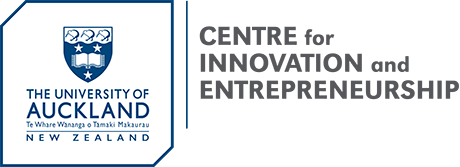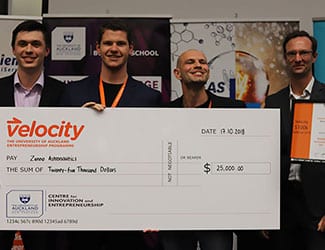

NEWSROOM
Velocity $100k Challenge winners look to the stars
New modular satellite software designed to simplify the process of sending satellites into space has emerged as the big winner in the 2018 Velocity $100k Challenge.
ZENNO Astronautics, the brainchild of Arts and Commerce student Will Haringa and Engineering students Max Arshavsky and Sebastian Wieczorek, focuses on mission planning tools designed to optimise resources while ensuring space is used responsibly and sustainably. In the words of the team, the aim of ZENNO is “to make space commercially compelling through propulsion systems that extend mission lifespans and allow maximum time in optimal conditions.”
As first-prize winners in the Velocity $100k Challenge, the team has secured $25,000 in seed capital to continue development and growth.
“We saw that software innovation was lagging behind hardware, so we developed a suite of software applications which can simulate satellite trajectory more accurately than existing methods,” says Haringa.
“The ZENNO Astrodynamics Toolkit is a fleet of software solutions sufficient to design, license, launch and operate a satellite.”
Runners-up in the Challenge were Electroclear, a team of Christopher Walker and Patrin Illenberger, PhD candidates from the Auckland Bioengineering Institute, and Associate Professor Iain Anderson from the Department of Engineering Science. Electroclear is developing a non-toxic solution for the prevention of biofouling – the build-up of biological growth on submerged surfaces – using ‘intelligent electronics’ to hinder the growth of fouling species in marine environments.
Also among the winners on the night were Avasa, developers of a surgical device to help surgeons perform microsurgery exponentially faster and with laser precision, who took home the New Ventures category.
Together for Good scooped the Social Enterprise category with their personalised relationship skills course that draws on the latest science to help clients have lasting, healthy relationships.
Lastly, the University Research category was awarded to H2Heal for their Surgical Canary device, designed to monitor patients for leaks after bowel surgery, the number one post-operation cause of death.
All of the five winning teams have also gained entry to VentureLab, an incubator run by the Centre for Innovation and Entrepreneurship (CIE), to continue development on their ventures.
The conclusion of the 2018 Challenge ends a banner year for Velocity, with over 250 entries to the Innovation Challenge and 95 to the $100k Challenge, more than any other time in Velocity’s 15-year history.
The Challenge was judged by a comprehensive business plan from each team and a twelve-minute pitch to a panel of seven judges plus question time. On the grand final celebration night each team had just 55 seconds to pitch their idea to the packed theatre, with online voting available for the audience favourite that ultimately ended in a tie between teams CultureNation and MOCHIYO.
Velocity CEO Matt Canham says, “The talent and passion that we’ve seen from this year’s teams is truly exceptional. The Velocity community will follow these teams closely as they continue to develop their ideas; we cannot wait to see what they achieve.”
Since Velocity’s inception as Spark in 2003, participants have gone on to launch more than 120 ventures, attract over $221 million in investment, create 600-plus jobs, and sell products and services into 37 countries.
Past entrants include Tectonus, whose first-of-its-kind earthquake protection systems were used in the construction of the new $32 million Nelson Airport terminal, and Greenspot Technologies, makers of nutrient-rich alternative flours who this month received $1.2 million seed funding from France.
Velocity would not have the impact that it does without the generous support they receive from their sponsors. A huge thank you to foundations partners: The University of Auckland Business School and The Icehouse; gold sponsors: ATEED, Return on Science and UniServices; silver sponsors: Hudson Gavin Martin and Yealands, for all that they contribute to the Velocity programme and people.

ZENNO Astronautics, first-prize winners in the Velocity $100k Challenge.

ZENNO Astronautics, first-prize winners in the Velocity $100k Challenge.
New modular satellite software designed to simplify the process of sending satellites into space has emerged as the big winner in the 2018 Velocity $100k Challenge.
ZENNO Astronautics, the brainchild of Arts and Commerce student Will Haringa and Engineering students Max Arshavsky and Sebastian Wieczorek, focuses on mission planning tools designed to optimise resources while ensuring space is used responsibly and sustainably. In the words of the team, the aim of ZENNO is “to make space commercially compelling through propulsion systems that extend mission lifespans and allow maximum time in optimal conditions.”
As first-prize winners in the Velocity $100k Challenge, the team has secured $25,000 in seed capital to continue development and growth.
“We saw that software innovation was lagging behind hardware, so we developed a suite of software applications which can simulate satellite trajectory more accurately than existing methods,” says Haringa.
“The ZENNO Astrodynamics Toolkit is a fleet of software solutions sufficient to design, license, launch and operate a satellite.”
Runners-up in the Challenge were Electroclear, a team of Christopher Walker and Patrin Illenberger, PhD candidates from the Auckland Bioengineering Institute, and Associate Professor Iain Anderson from the Department of Engineering Science. Electroclear is developing a non-toxic solution for the prevention of biofouling – the build-up of biological growth on submerged surfaces – using ‘intelligent electronics’ to hinder the growth of fouling species in marine environments.
Also among the winners on the night were Avasa, developers of a surgical device to help surgeons perform microsurgery exponentially faster and with laser precision, who took home the New Ventures category.
Together for Good scooped the Social Enterprise category with their personalised relationship skills course that draws on the latest science to help clients have lasting, healthy relationships.
Lastly, the University Research category was awarded to H2Heal for their Surgical Canary device, designed to monitor patients for leaks after bowel surgery, the number one post-operation cause of death.
All of the five winning teams have also gained entry to VentureLab, an incubator run by the Centre for Innovation and Entrepreneurship (CIE), to continue development on their ventures.
The conclusion of the 2018 Challenge ends a banner year for Velocity, with over 250 entries to the Innovation Challenge and 95 to the $100k Challenge, more than any other time in Velocity’s 15-year history.
The Challenge was judged by a comprehensive business plan from each team and a twelve-minute pitch to a panel of seven judges plus question time. On the grand final celebration night each team had just 55 seconds to pitch their idea to the packed theatre, with online voting available for the audience favourite that ultimately ended in a tie between teams CultureNation and MOCHIYO.
Velocity CEO Matt Canham says, “The talent and passion that we’ve seen from this year’s teams is truly exceptional. The Velocity community will follow these teams closely as they continue to develop their ideas; we cannot wait to see what they achieve.”
Since Velocity’s inception as Spark in 2003, participants have gone on to launch more than 120 ventures, attract over $221 million in investment, create 600-plus jobs, and sell products and services into 37 countries.
Past entrants include Tectonus, whose first-of-its-kind earthquake protection systems were used in the construction of the new $32 million Nelson Airport terminal, and Greenspot Technologies, makers of nutrient-rich alternative flours who this month received $1.2 million seed funding from France.
Velocity would not have the impact that it does without the generous support they receive from their sponsors. A huge thank you to foundations partners: The University of Auckland Business School and The Icehouse; gold sponsors: ATEED, Return on Science and UniServices; silver sponsors: Hudson Gavin Martin and Yealands, for all that they contribute to the Velocity programme and people.
EMAIL
CIE@AUCKLAND.AC.NZ
POSTAL ADDRESS
THE UNIVERSITY OF AUCKLAND BUSINESS SCHOOL
PRIVATE BAG 92019, AUCKLAND













